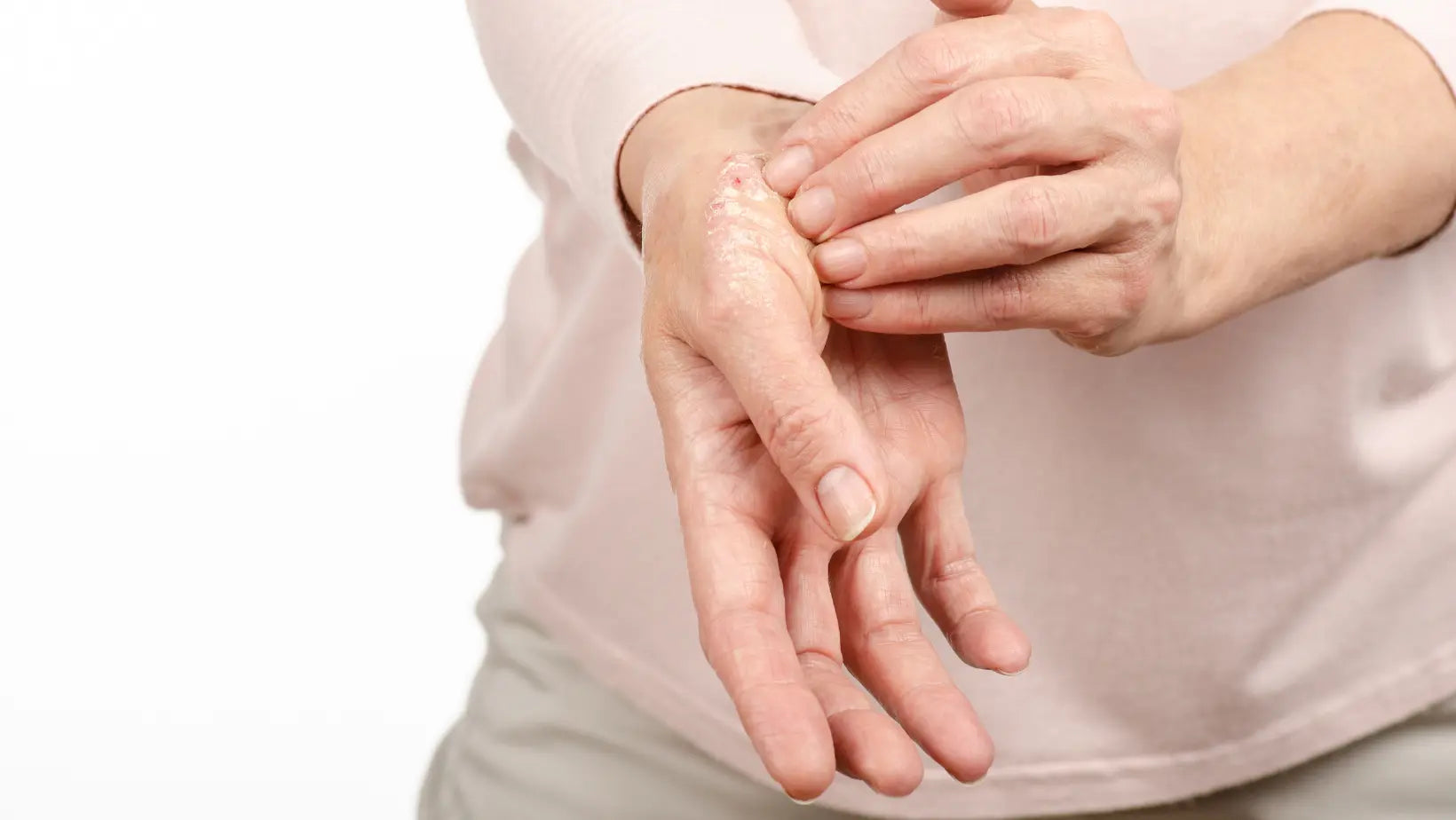
Psoriasis: A dermatological condition with possible complications for the entire body
Psoriasis is a chronic skin condition characterized by the appearance of red plaques covered with silvery scales, which can cause itching or pain. This autoimmune disease accelerates the life cycle of skin cells, causing them to accumulate rapidly on the surface of the skin. The main symptoms of psoriasis include red patches, dry, cracked skin that may bleed, and thickened or pitted nails.
It is essential to discuss the complications of psoriasis beyond the skin because this condition does not only affect the skin but can have a significant impact on the entire body. Complications can include psoriatic arthritis, cardiovascular problems, metabolic disorders, and psychological issues. Understanding these complications can help you take preventive measures and better manage the disease.
The purpose of this article is to provide you with detailed information about the impact of psoriasis on the entire body. We will explore not only the skin symptoms but also the long-term complications that may arise. We want to help you understand the importance of a holistic approach in managing psoriasis and offer you practical advice to maintain optimal health.
The impact of psoriasis on the skin
Plates and inflammation:

Psoriasis manifests through the appearance of characteristic skin lesions known as psoriatic plaques. These plaques are red, raised patches covered with silvery scales, most commonly appearing on the elbows, knees, scalp, and lower back. The underlying inflammation causes redness and swelling of the affected skin. The plaques can vary in size and shape, and their severity can range from mild to severe. In more severe cases, the plaques can cover large areas of the body and cause significant pain and discomfort.
Discomfort and aesthetic impact:
Psoriasis affects not only the skin but also the quality of life and self-esteem. The physical discomfort caused by itching, burning, and pain can be overwhelming, interfering with daily activities and sleep. The aesthetic appearance of psoriatic plaques can lead to feelings of shame, anxiety, and social isolation. Many people with psoriasis avoid certain activities or clothing that would expose the affected skin, thus impacting their social and professional life. The stigma associated with psoriasis can amplify these feelings, highlighting the importance of emotional support and public education to reduce prejudice and improve the quality of life for those affected.
Complications of psoriasis
1. Psoriatic arthritis
Psoriatic arthritis is a form of inflammatory arthritis that affects some people who suffer from psoriasis. It is a chronic condition that causes inflammation in the joints and in the areas where ligaments and tendons attach to bones. It can affect any part of the body, including the fingers, knees, ankles, and spine. Unlike other forms of arthritis, psoriatic arthritis can also cause damage to the nails and the skin around the affected joints.
Symptoms:
- Pain, tenderness, and swelling in the joints.
- Joint stiffness, especially in the morning or after periods of inactivity.
- Inflammation and pain in the tendons and ligaments (enthesitis).
- Changes in the nails, such as pitting or detachment of the nails from the nail bed.
- Generalized fatigue and decreased mobility.
Impact:

Psoriatic arthritis can have a significant impact on mobility and quality of life. Chronic inflammation and joint pain can limit the ability to perform daily activities such as walking, writing, or lifting objects. In severe cases, it can lead to joint deformities and loss of joint function, thus affecting the ability to work and participate in social activities. Additionally, constant pain and discomfort can contribute to sleep problems and a reduced quality of life. People with psoriatic arthritis may also experience episodes of anxiety and depression due to chronic pain and physical limitations.
2. Cardiovascular problems
Risks:
Psoriasis is not just a skin condition, but it can have serious implications for overall health, including the cardiovascular system. People with psoriasis have an increased risk of developing cardiovascular diseases, such as hypertension, coronary artery disease, and strokes. The chronic inflammation associated with psoriasis plays a crucial role in this connection. Persistent systemic inflammation can contribute to the development of atherosclerotic plaques in the coronary arteries, increasing the risk of arterial obstruction and major cardiovascular events.
Studies:
Research has highlighted the connection between psoriasis and cardiovascular diseases. A study published in the "Journal of the American Academy of Dermatology" showed that people with severe psoriasis have up to a 58% higher risk of developing major cardiovascular events compared to those without psoriasis. Another study, published in "The American Journal of Cardiology," indicated that patients with psoriasis have a higher prevalence of metabolic syndrome, a group of conditions that include hypertension, dyslipidemia, and obesity, all of which contribute to cardiovascular risk.

Additionally, a study conducted by the "European Heart Journal" found that the chronic inflammation observed in psoriasis can accelerate the process of atherosclerosis, which is a major cause of cardiovascular diseases. These studies highlight the need for careful monitoring of cardiovascular health in patients with psoriasis and the adoption of proactive measures to reduce risk, including lifestyle changes and medication treatments that control inflammation and manage cardiovascular risk factors.
3. Metabolic complications
Diabetes and obesity:
Psoriasis does not only affect the skin but can have a significant impact on metabolic health. Research shows that people with psoriasis have a higher risk of developing type 2 diabetes and obesity. The chronic inflammation associated with psoriasis contributes to insulin resistance, a key factor in the development of type 2 diabetes. Ongoing inflammation can affect the function of beta cells in the pancreas, which are responsible for producing insulin, leading to impaired blood sugar regulation.
Obesity is also commonly found in patients with psoriasis. Systemic inflammation can lead to the accumulation of adipose tissue, especially in the abdominal area. This not only exacerbates the symptoms of psoriasis but also contributes to a vicious cycle of inflammation and weight gain. Studies suggest that obese individuals with psoriasis often have more severe symptoms and respond less effectively to treatments compared to patients with normal weight.

Metabolic syndrome:
Metabolic syndrome is a group of conditions that occur together, increasing the risk of cardiovascular diseases, diabetes, and strokes. These conditions include high blood pressure, high blood sugar levels, excess body fat around the waist, and abnormal cholesterol or triglyceride levels. People with psoriasis are more likely to develop metabolic syndrome.
Chronic inflammation plays a central role in this association. Psoriasis causes increased activity of immune cells that release inflammatory cytokines. These inflammatory molecules affect not only the skin but also metabolism, contributing to dysfunctions in blood sugar regulation and to increased blood pressure and blood lipids. Studies have shown that patients with psoriasis have a significantly higher prevalence of metabolic syndrome compared to the general population.
4. Psychological problems
Depression and anxiety:
Psoriasis, beyond its physical manifestations, has a profound impact on mental and emotional health. People suffering from psoriasis are more prone to depression and anxiety due to chronic pain, discomfort, and the social stigma associated with this disease. The stress caused by managing a chronic condition can amplify feelings of helplessness and despair.
Depression can manifest through symptoms such as loss of interest in enjoyable activities, persistent feelings of sadness, extreme fatigue, and difficulty concentrating. Anxiety, on the other hand, can include symptoms such as constant restlessness, panic attacks, and intrusive thoughts related to skin appearance and social perception. Studies show that patients with psoriasis have higher rates of anxiety and depression disorders compared to the general population, highlighting the need for appropriate psychological support.

Social stigma:
Psoriasis can have a devastating effect on social and professional relationships. The visible appearance of psoriatic plaques can lead to discrimination and social isolation. People with psoriasis often face stares, rude comments, and rejection, which can affect their self-esteem and self-confidence.
The stigma associated with psoriasis can prevent patients from participating in social activities, developing their careers, or feeling comfortable in the professional environment. The fear of being judged or rejected can lead some patients to completely avoid social interactions, which contributes to feelings of loneliness and isolation.
How to cope with psoriasis symptoms
Managing psoriasis symptoms can be challenging, but there are effective solutions that can help you control this condition. For dermatological symptoms, we recommend topical, natural psoriasis treatments from the Royal Rich range. These products contain essential oils and minerals, as well as salts from the Dead Sea, which penetrate the skin very easily, reduce itching and redness, and are particularly effective adjuncts against the harmful effects caused by psoriasis. The natural active ingredients prevent the progression of lesions in the affected areas and have moisturizing and soothing effects. We recommend the psoriasis cream, oil, and psoriasis shampoo from the Royal Rich range for complete care.

To cope with the other complications associated with psoriasis, we encourage you to consult your doctor for a personalized treatment plan and to join support groups for emotional and community support. These measures can significantly improve your quality of life and help you better manage this complex condition.
Psoriasis is a complex condition that can affect not only the skin but the entire body, having serious implications for physical and mental health. Understanding and properly managing the symptoms and complications of psoriasis are essential to maintaining the highest possible quality of life. It is important to approach psoriasis with a holistic strategy that includes effective topical treatments for the skin, as well as medical and emotional support for other complications.
If you are dealing with psoriasis, don't hesitate to explore the natural treatments from the Royal Rich range, which include cream, oil, and shampoo for psoriasis, all formulated to reduce itching, redness, and to hydrate the skin. For a comprehensive approach to your health, consult your doctor and join support groups to receive the necessary support. Choose to take care of yourself and improve your quality of life with the help of available products and resources.



Leave a comment
This site is protected by hCaptcha and the hCaptcha Privacy Policy and Terms of Service apply.